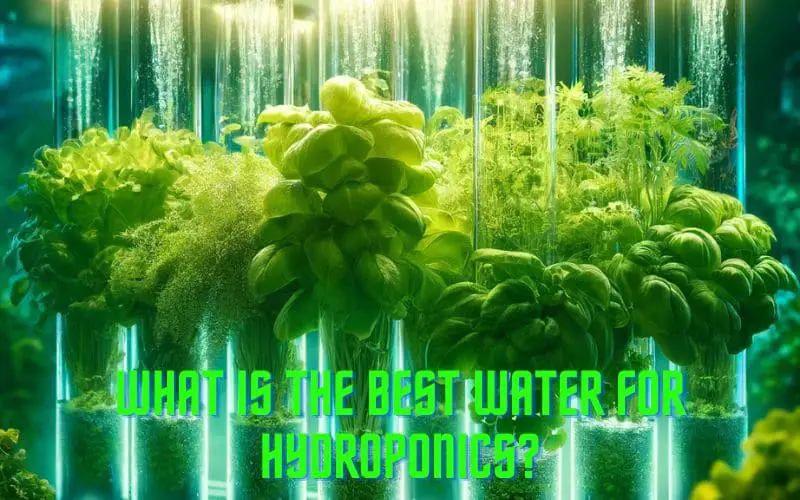What Is The Best Water For Hydroponics? Let's Find Answers!!

Introduction
Welcome to our comprehensive exploration of hydroponic soilless agriculture, where we delve deep into the world of hydroponic systems and water quality for hydroponics. In this article, we aim to provide detailed insights and expert knowledge on hydroponic techniques, sustainable practices, and the best water sources for hydroponics. Whether you are a novice enthusiast or an experienced hydroponic gardener, this article will equip you with the essential information you need for successful hydroponic cultivation.
Answer to the Question
The best water for hydroponics is a crucial element that contributes to the overall success of a hydroponic system. In the following sections, we will explore the factors that contribute to water quality for hydroponics and identify the best water sources for cultivating healthy and thriving hydroponic plants.
Understanding Hydroponic Systems
What is Hydroponics?
Hydroponics is a soilless farming technique that allows plants to grow in a nutrient-rich water solution. It provides an alternative to traditional soil-based cultivation and offers numerous benefits for plant growth and sustainability.
Benefits of Hydroponics
- Water Conservation: Hydroponic systems use up to 90% less water than traditional soil-based farming methods, making them an environmentally sustainable option.
- Efficient Nutrient Uptake: Plants grown in hydroponic systems have direct access to the nutrients they need, resulting in faster growth and higher yields.
- Space Optimization: Hydroponic setups can be tailored to fit any space, making them ideal for urban environments where land is limited.
- Urban Farming: Hydroponics allows for the cultivation of fresh produce in urban areas, reducing the need for long transportation routes and providing access to locally grown food.
- Faster Growth Rates: By providing a controlled environment with optimized growing conditions, hydroponic systems promote accelerated plant growth.
- Higher Yields: The precise control of nutrients, water, and light in hydroponic systems leads to increased productivity and higher crop yields compared to traditional soil-based farming.
Types of Hydroponic Systems
Hydroponic systems encompass various types such as Deep Water Culture (DWC), Nutrient Film Technique (NFT), Ebb and Flow (Flood and Drain), and Drip System. Each system has unique characteristics and is suitable for different plant species and cultivation requirements. Let’s explore each type in more detail:
Deep Water Culture (DWC): This type of hydroponic system involves suspending the plant roots in a nutrient solution. The plants are supported by floating platforms or rafts, allowing their roots to absorb oxygen and nutrients from the solution. DWC systems are particularly effective for growing leafy greens and herbs due to the ample supply of water and nutrients.
Nutrient Film Technique (NFT): In NFT systems, a thin film of nutrient-rich water is circulated past the bare roots of plants. This continuous flow provides a constant supply of nutrients and water, making it suitable for smaller, quick-growing plants like lettuce and strawberries.
Ebb and Flow (Flood and Drain): These systems work by periodically flooding the plant roots with nutrient solution and then draining it. This cyclic process ensures that the roots receive proper aeration and moisture, making it a versatile system for various plant types, including flowering plants and fruit-bearing crops.
Drip System: Drip systems deliver a controlled supply of nutrient solution directly to the plant roots using a network of drip lines or emitters. This method allows for precise nutrient delivery, making it suitable for large-scale commercial hydroponic operations and a wide range of plant species, from tomatoes and peppers to cucumbers and melons.
Water Quality for Hydroponics
Importance of Water Quality
Water quality is of utmost importance in hydroponics as it directly impacts the overall health and productivity of the plants. High-quality water plays a vital role in ensuring that plants receive the necessary nutrients, thus promoting optimal growth and development. Additionally, maintaining superior water quality helps in preventing the occurrence of diseases and nutrient deficiencies, which are common challenges in hydroponic systems. By prioritizing water quality, hydroponic growers can create an environment that fosters robust plant growth, leading to abundant and high-quality harvests.
Factors to Consider for Water Quality
When assessing water quality for hydroponics, it’s important to take into account several key factors that directly impact plant growth and health. Here are the primary considerations:
- pH Levels: Maintaining the correct pH level of the water is crucial for nutrient availability and absorption by plants. The ideal pH range for hydroponic systems is typically between 5.5 and 6.5. Regular monitoring and adjusting of pH levels are essential for optimal plant growth.
- Electrical Conductivity (EC): EC measurement indicates the concentration of nutrients in the water. Monitoring EC levels helps ensure that the plants receive the appropriate amount of nutrients for healthy development. It’s important to strike a balance and avoid excessive nutrient levels, which can lead to nutrient imbalances or toxicity.
- Water Purity: High-quality water is essential for hydroponic systems. Impurities such as chlorine, heavy metals, and microbial contaminants can negatively impact plant health. Using purified or filtered water can help prevent such issues and contribute to the overall success of the hydroponic setup.
- Absence of Contaminants: Regularly checking for the presence of contaminants such as pathogens, fungi, and algae is vital to maintain a healthy growing environment. Implementing preventive measures and proper sanitation protocols can significantly reduce the risk of contamination, thus promoting robust plant growth.
Best Water Sources for Hydroponics
Choosing the right water source is crucial for the success of your hydroponic system. Here are the best water sources for hydroponics:
- Purified Water: Purified water is free from contaminants and minerals, making it an ideal choice for hydroponic systems. It provides a clean and stable base for plant growth.
- Reverse Osmosis Water: This type of water is filtered through a semipermeable membrane to remove impurities and minerals. It’s a popular choice for hydroponic setups due to its purity and balanced pH levels.
- Rainwater: Rainwater collected from reliable sources can be an excellent natural water source for hydroponics. It’s clean, free from chemicals, and provides the necessary nutrients for plant growth.
- Well Water: Well water can be suitable for hydroponics if it’s tested and treated to ensure it’s free from harmful substances and balanced in mineral content.
Conclusion
In conclusion, understanding the significance of water quality in hydroponics is pivotal for successful plant cultivation. With the right water sources and a comprehensive understanding of hydroponic systems, enthusiasts and growers can embark on a journey towards sustainable and bountiful hydroponic gardening. Embracing soilless agriculture, sustainable practices, and optimal water quality sets the stage for innovative and efficient plant growth within minimal spaces.
